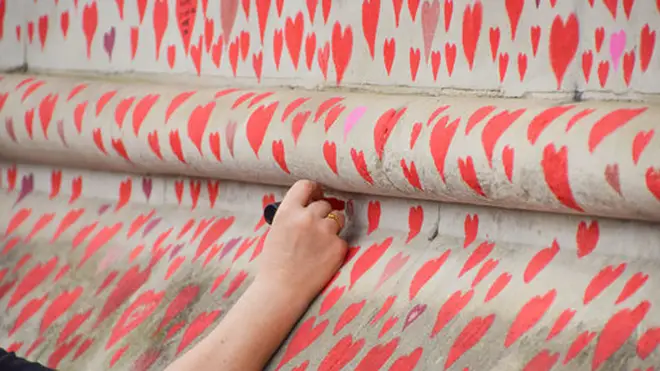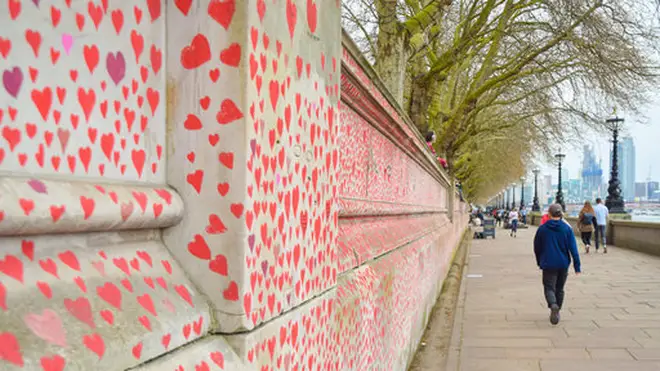
Dean Dunham 9pm - 10pm
2 April 2021, 15:01 | Updated: 2 April 2021, 15:04

Bereaved families tell LBC why they're drawing hearts opposite Parliament
Over 150,000 hearts are being drawn opposite the Houses of Parliament to commemorate everyone lost to the coronavirus in the UK.
Bereaved families have explained what the Covid-19 memorial wall means to them, and said that the process of painting is “therapeutic” and a “tangible” way to grieve.
The National Covid Memorial Wall in London aims to remember those who died during the pandemic, and bereaved families are currently filling the 6.5-foot-high wall with thousands of hearts.
Britain has so far recorded just over 149,000 such deaths, the fifth highest in the world.

James O'Brien's reaction to UK having highest death toll in Europe
Sue Vosper has been at the wall since Monday and works on the wall ten hours a day, she estimates she has painted around 1000 hearts.
Sue lost her Dad to Covid-19 in April 2020 said “this is very therapeutic for me, a year later”. She added that her sister is in Australia “so we cannot grieve together” so the wall is a “tangible” therapeutic tool to cope with grief.
“We will continue to add to them as more lives are lost. They are each unique and individual, there is no template because each person was unique and individual,” she added.
Given that the wall is across from the Houses of Parliament, she said: “I do not think they can ignore it any longer - it is perfectly placed.”
The memorial is expected to eventually stretch from Westminster Bridge, opposite Big Ben and the Houses of Parliament, to Lambeth Bridge.
On one side it faces Parliament, where some lawmakers have called for a public inquiry into the handling of the pandemic by Boris Johnson.

Fran Hall has also been at the memorial since Monday. Her longterm partner died in October, three weeks after they got married.
She said: “This is the first time I have been among people who really understand the experience of losing somebody to Covid-19 during the pandemic has been like, this has really helped me.”
“I thought this would be an incredible historical thing to be part of. I came on Monday to do a shift and I’ve been back every day since because it is incredibly therapeutic to do,” she says.
Fran, who estimates they reached about a third of the way yesterday - at around 50,000 hearts, explains this is “one for every person who had Covid-19 on their death certificate, so it will be more than the government official figures,”.
Fran noted that the scale of the loss very much hit home seeing the memorial, “you don’t understand the numbers when you hear it, you can’t visualise what 150,000 people look like, but when you see 150,000 hearts on a wall and it takes you ten minutes to walk past them…I think it is really impactful”.

Should there be a public inquiry into the Covid crisis?
Becky Kumar lost her Dad, Peter, to Covid-19 last April.
“The first heart I drew was for my Dad. We did not have a funeral, we have not had a memorial because of all the rules, and none of us could be there even though Dad died in hospital,” she said.
Becky added: “We have not had any of the grieving rituals that in the normal world people would have had”.
“Just to be here has been very cathartic, very therapeutic, and being amongst other people that have lost someone,” she said.
She estimates she has painted about 500 hearts so far, saying “each heart I have painted with great care and attention because each heart represents a unique loved one,”.
“I think it is really important for me to remember that my Dad was not just a number. I have seen essentially what has been his death on charts on graphs, he has been reduced to a number, and he is very much not a number,” she said.

Becky added: “Although we don’t want this to be an antagonistic political statement, it is opposite the Houses of Parliament where MPs can see the hearts and it just brings people the personal stories behind them - that they are not just numbers,”.
“It is good for MPs to see it from across the river,” and “we hope this will be here for a very long time,” she said.
She added: “It is very significant it is opposite the Houses of Parliament, underneath St Thomas’s hospital where Boris Johnson was in intensive care almost exactly this time past year,”.
She is part of the Covid bereaved families for justice and said “I think a lot of these lives should not have been lost to Covid-19, personally, that’s why we will hopefully have a public enquiry starting in the near future”.
She also said: “It would be lovely for Johnson to come down to the wall, look us in the eye, and hear some of our stories”.